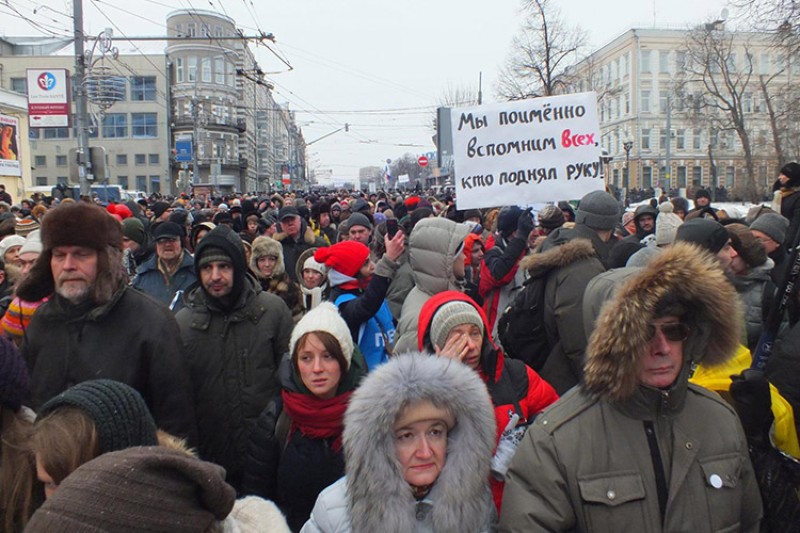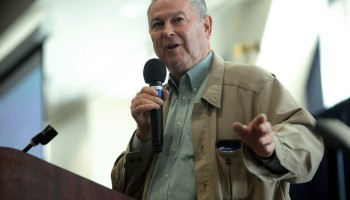And yet, his name is included in a 2014 EP recommendation that targets Russians involved in a tax scam that has made headlines around the world.
The “Magnitsky case,” which claimed the life of auditor Sergei Magnitsky in 2009 — and which the country’s law enforcement apparatus has shown little interest in seriously investigating — has become emblematic of the capture of the Russian justice system by powerful interests. It demonstrates how far the apparatus of the Russian state is willing to go to protect criminals with friends in high places.
How did someone like Pavlov, who holds no official position or public office, become so deeply implicated in the affair?
Some of the answers lie in an email archive allegedly belonging to Pavlov that was obtained by Novaya Gazeta, a partner of the Organized Crime and Corruption Reporting Project (OCCRP).
The emails include Pavlov’s informal communications with members of Russia’s law enforcement agencies, many of whom behave as if they are in a subordinate position to him. They also contain discussions of what seem to be bribes passed to arbitration court judges to ensure “correct” outcomes.
The archive goes a long way towards explaining how a man like Pavlov was able to wield so much influence. The emails paint a picture of a man deeply implicated in large-scale fraud who is able to use his connections to skew judicial processes in his favor, demonstrating the extent to which the rule of law in Russia has been superseded by secret, informal relationships among powerful people.
The 5-gigabyte archive covers the period from July 2012 to October 2014. Journalists from Novaya Gazeta spent several months examining the correspondence, which was originally leaked onto the internet by unknown parties. But the story was delayed when Pavlov got a Moscow court to order its publication stopped. That order was recently lifted on appeal.
An Intimidation Attempt
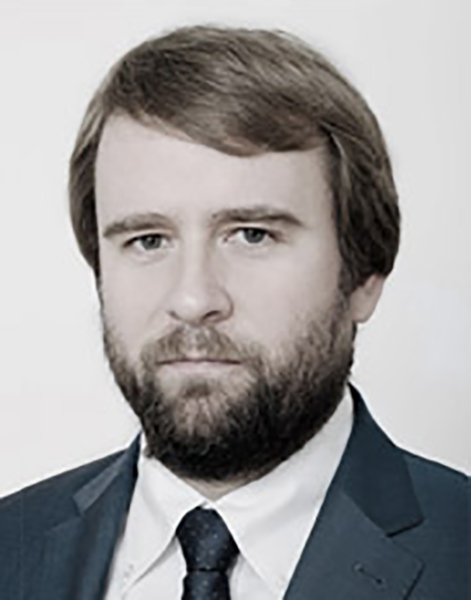 Andrei Pavlov, a Russian corporate lawyer targeted for sanctions by the European Parliament for alleged involvement in the Magnitsky case. (Photo: Quorumlegal.ru) Novaya Gazeta reporters talked to Pavlov last August.
Andrei Pavlov, a Russian corporate lawyer targeted for sanctions by the European Parliament for alleged involvement in the Magnitsky case. (Photo: Quorumlegal.ru) Novaya Gazeta reporters talked to Pavlov last August.
Well-manicured, sandy blond, and wearing an expensive suit, Pavlov gives the impression of being a courteous yet influential middle-aged man. He is animated, speaking passionately and with apparent sincerity about the questions raised by reporters.
Shortly after the initial interview, Pavlov contacted a Novaya Gazeta journalist and asked to meet again so that he could provide additional comments.
Instead, at the second meeting, Pavlov gave reporters a folder containing a lawsuit against Novaya Gazeta, demanding the destruction of all email records and a payment of 2 million rubles (US$ 31,000) for “moral harm” caused by the still-unpublished story. The folder also included a court order restraining Novaya Gazeta from publishing anything about the matter. On Jan. 30, this order was lifted on appeal, allowing the newspaper and OCCRP to publish this story.
What was in Pavlov’s alleged emails that he so wanted to keep private?
“Don’t approach with less than 100”
Some of the emails appear to discuss the bribery of arbitration court judges. Many feature Pavlov’s colleague, a lawyer named Alexander Shmakov, who heads Russian Experts, a Moscow-based law firm.
They show that, for more than two years, emails allegedly from Pavlov and Shmakov discuss large sums of money apparently intended to influence arbitration court judges to rule in favor of their clients. The names of the judges, the companies on whose behalf the payments were allegedly made, and the court case numbers that appeared in the emails were all verified by Novaya Gazeta.
In one email, sent on Dec. 24, 2012, Pavlov allegedly describes his desired outcome in a case: “I’d expect the granting of the petition on [using] an expert opinion, and if the opinion finds that the additional agreement is counterfeit, [I’d want] the case to be denied due to an expired statute of limitations.”
Shmakov allegedly replies: “It’s in the hands of the chairman of the court - don’t approach with less than 100 + intermediaries/us, so it comes out to 140-150.” It is not clear what monetary units they are describing.
In June 2013, another alleged email from the same address is sent to “Shmakov” about another case, bearing a similar request - to help ensure the “correct” outcome. On June 13, 2013, “Shmakov” replies, quoting a price: “For the next episode, which is on Monday, [we’ll] need to give at least 250 d.” Presumably, this refers to a sum of US$ 250,000.
During his interview with Novaya Gazeta, after a quick glance at these emails, Pavlov broke out in laughter: “I can’t even imagine what you’re trying to ask. You can see here that I’m hiring my colleague to work on a case for my clients. But I can’t divulge the details of the cases - you understand, to protect my clients.”
Later, in the lawsuit against Novaya Gazeta, Pavlov declared that these emails were not his.
When asked about this correspondence, Shmakov confirmed that he is acquainted with Pavlov, saying that the two are connected by “business and interpersonal ties.” He did not deny corresponding by email with Pavlov, but insisted that “there could not be any illegal actions under discussion” in it.
Shmakov said his e-mail account had been compromised. “The email account you’re talking about really did belong to me,” he said. “I opened it in 2011 at the request of one of my clients. After some time it was stolen from me - the password was stolen. This was at the end of 2012 or beginning of 2013.”
The information in the trove of emails is not limited to alleged manipulation of court cases on behalf of Pavlov’s clients. It also contains evidence that he may have been able to influence the results of an investigation into the Magnitsky case.
Pavlov and the Magnitsky case
What is now known to the world as the Magnitsky case is essentially a complex tax fraud involving many interrelated criminal cases.
The story began back in 2007 with the prosecution of the Hermitage Capital Management fund and its American-born CEO and founder, William Browder, for alleged tax crimes in Russia.
During an investigation into Browder, detectives searched the Russian offices of Hermitage Capital Management and Firestone Duncan, a law firm which had provided the fund with advisory services. Among other things, they seized registration documents and official seals belonging to three of the fund’s subsidiaries: Riland, Makhaon, and Parfenion.
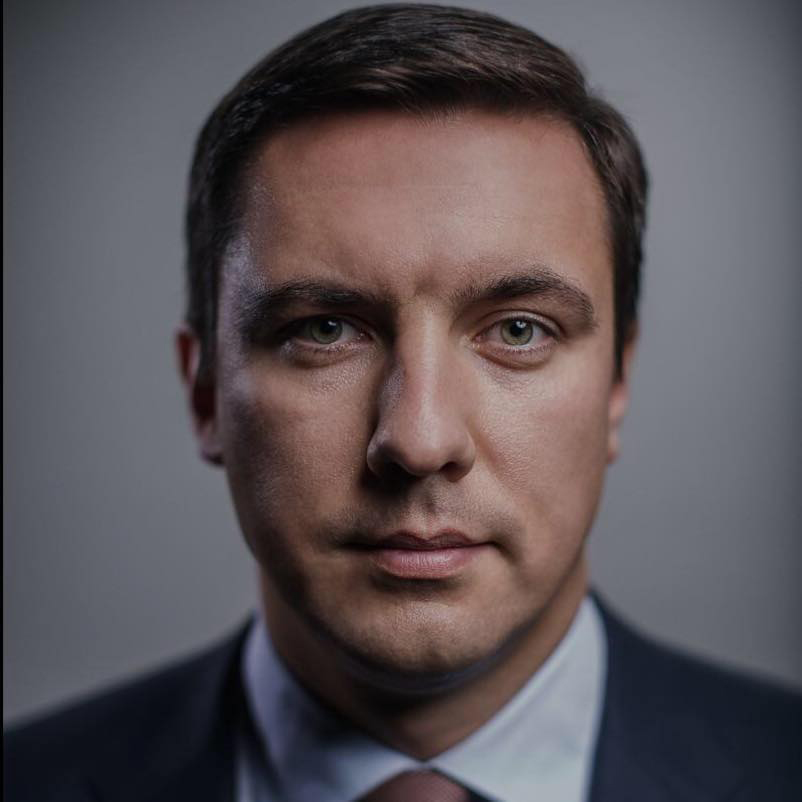 Pavel Karpov, the former Moscow police investigator who worked on the Magnitsky case. (Photo: Facebook). Pavel Karpov, a Moscow police investigator, had control of the stamps. Shortly afterwards, the three companies were re-registered under a fictitious firm. Browder later claimed that the companies were “raided” -- a distinctly Russian financial crime where organized criminals steal a company from its owner by re-registering it in their name.
Pavel Karpov, the former Moscow police investigator who worked on the Magnitsky case. (Photo: Facebook). Pavel Karpov, a Moscow police investigator, had control of the stamps. Shortly afterwards, the three companies were re-registered under a fictitious firm. Browder later claimed that the companies were “raided” -- a distinctly Russian financial crime where organized criminals steal a company from its owner by re-registering it in their name.
Soon after the three subsidiaries were stolen from Hermitage, a set of offshore companies filed false claims against the Hermitage subsidiaries. Both parties - the new subsidiaries and the offshore plaintiffs -- were represented in court by either Pavlov or his ex-wife with the couple switching sides between cases. The arbitration courts ruled for the plaintiffs and entered judgments that created giant paper losses for the three Hermitage subsidiaries. The losses almost exactly offset Hermitage’s income in 2006.
Since, on paper, the subsidiaries no longer made a profit, the perpetrators were able to file refund requests on their behalf for 5.4 billion rubles ($230 million) in taxes that the companies had previously paid. The money was quickly refunded, and the perpetrators — including people close to Pavlov — then spirited the money out of the country through offshore accounts. Some was used to buy luxury real estate around the world.
The deal became known as the Magnitsky case after Sergei Magnitsky, an auditor working for Browder, reported it to authorities — only to be arrested himself and charged with tax evasion. He later died in jail from abuse and neglect and was convicted of the crime posthumously. The same investigators looking into the crimes that Magnitsky revealed ended up also investigating Magnitsky himself, even after his death.
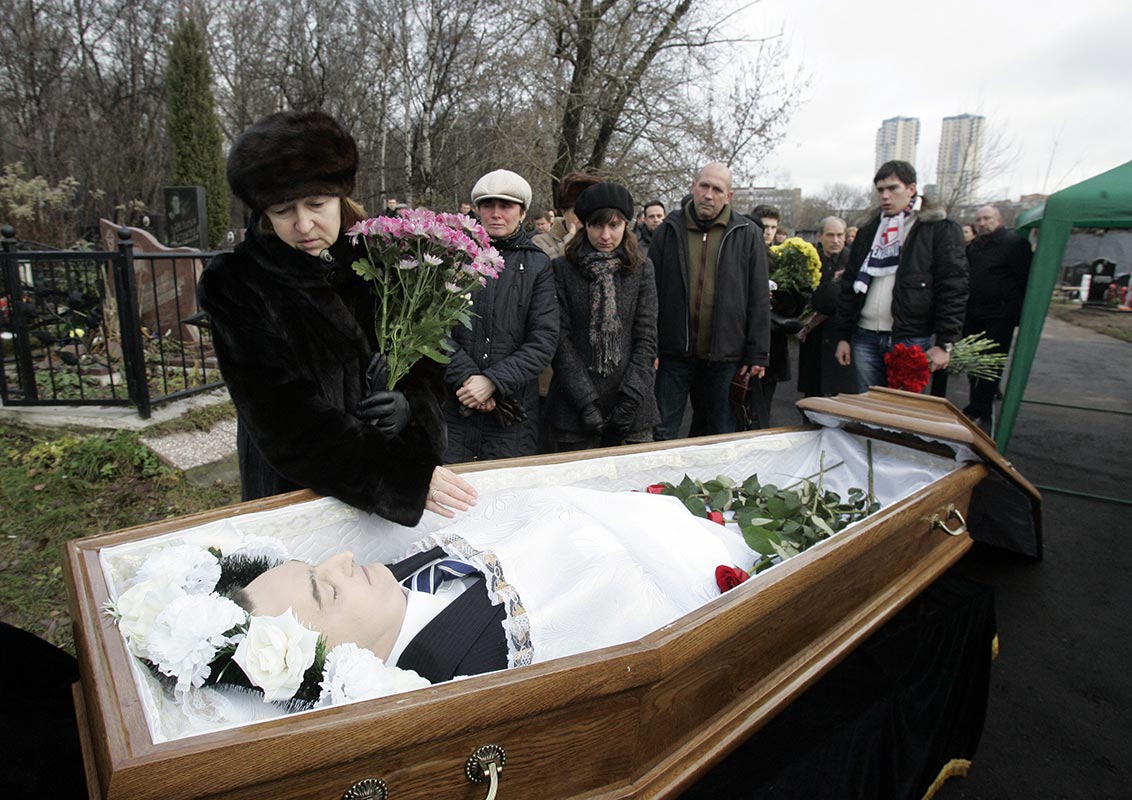 Natalia Magnitskaya, mother of Sergei Magnitsky, grieves over her son's body during his funeral at a cemetery in Moscow on Nov. 20, 2009. (Photo: REUTERS/Mikhail Voskresensky)
Natalia Magnitskaya, mother of Sergei Magnitsky, grieves over her son's body during his funeral at a cemetery in Moscow on Nov. 20, 2009. (Photo: REUTERS/Mikhail Voskresensky)
Instructions for investigators?
The theft of $230 million from the state budget could not be ignored, so in 2008 the Ministry of Internal Affairs launched an investigation. But despite the fact that Magnitsky’s colleagues repeatedly pointed to Pavlov as deeply involved in the affair, the investigators showed little interest in him.
An examination of the email archive may reveal why. They allegedly show that Pavlov was in regular correspondence with two people whose names match the names of investigators assigned to the case: Pavel Karpov and Oleg Urzhumtsev.
The name of a third person in the email correspondence slightly differs from the name of another investigator - Nikolai Budilo - but the content of the correspondence matches the cases in which both men had were involved.
The emails reveal what seems to be a close relationship between Pavlov and the three men and, at times, their apparent willingness to influence law enforcement and judicial processes at his request. An expert consulted by OCCRP who examined the emails said that, if real, this kind of correspondence throws serious doubt on the investigators’ impartiality.
In one key episode revealed in the archive, “Pavlov” appears to exert influence on a major follow-up inquiry to the earlier tax fraud. This subsequent investigation began in 2009, when then-President Dmitri Medvedev demanded that law enforcement agencies look into the circumstances surrounding Sergei Magnitsky’s death in detention. The case dragged on for many years, but produced no results. In the end, not one Federal Penitentiary Service officer or investigator was punished. Judging by the hacked emails, the investigation was very much on Pavlov’s mind.
In a 2013 discussion, the emails show Pavlov chatting about the case with Oleg Urzhumtsev, the name of a former police investigator who had simultaneously investigated both the case against Browder and Magnitsky and the tax scam Magnitsky revealed. By 2013 Urzhumtsev was no longer a police investigator, but appeared to still have good connections with the investigation committee -- and the emails show him to have used these to help Pavlov.
In the correspondence, Pavlov tells Urzhumtsev that they need to find an expert who could prove that the seals seized by police during the investigation into Hermitage Capital back in 2007 were not the same ones that were used to carry out the tax fraud.
This would confirm Pavlov’s main line of defense: That because the seals placed into Karpov's keeping were not used, Pavlov and Karpov were not involved in the tax scam.
In the end, just as Pavlov had suggested, the expert testimony was procured -- and was cited among the official reasons for the closing of the investigation into Magnitsky’s death.
During the interview and in his suit against Novaya Gazeta, Pavlov confirmed that this set of emails were his. “But what do you see in it?” he asked. “That a lawyer and an investigator know one another and are discussing a case? I see that some people are gathering information for a criminal case. Here’s the most important question: Was the expert opinion falsified or did someone simply want it to be conducted?”
Urzhumtsev refused to speak with Novaya Gazeta.
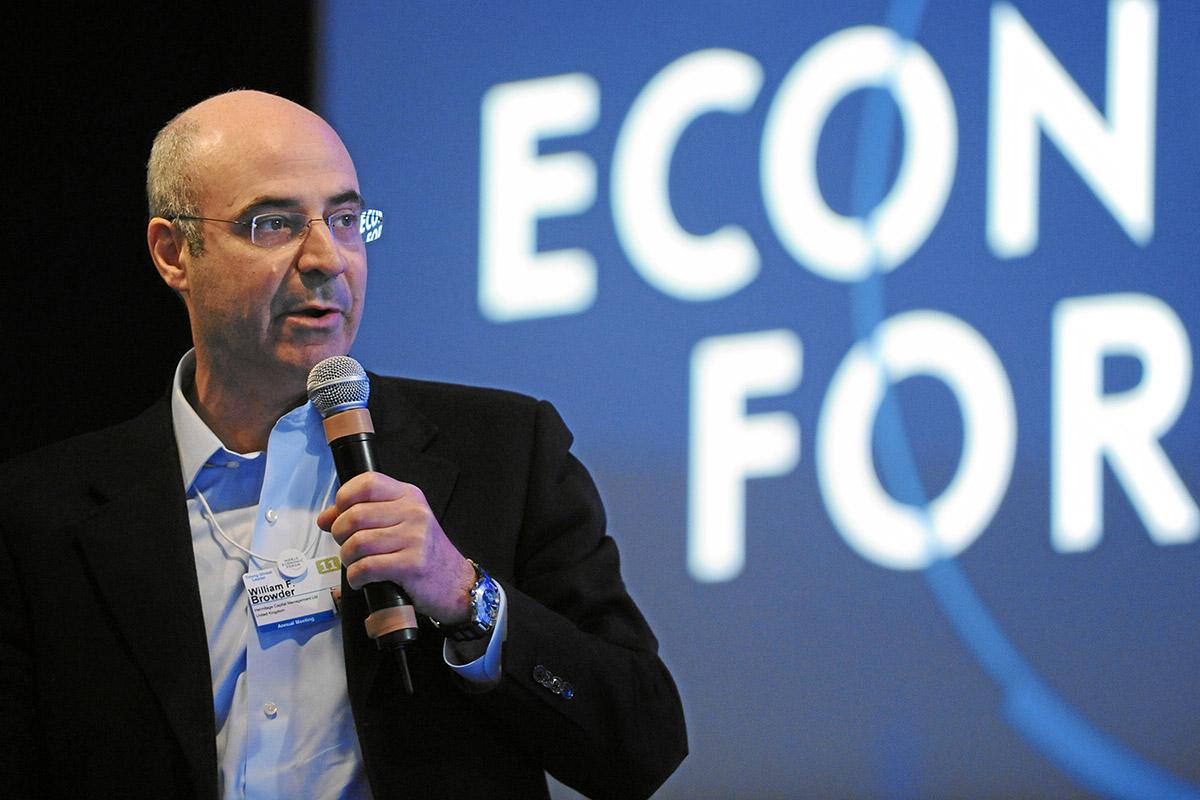 William Browder, the CEO and founder of Hermitage Capital Management, speaks at the World Economic Forum in Davos, Switzerland on Jan. 27, 2011. (Photo: World Economic Forum, CC BY-SA 2.0)
William Browder, the CEO and founder of Hermitage Capital Management, speaks at the World Economic Forum in Davos, Switzerland on Jan. 27, 2011. (Photo: World Economic Forum, CC BY-SA 2.0)
From London to the ‘Distant Steppe’
The Magnitsky case had repercussions that have reverberated for years, with Russian courts continuing to pursue Browder even in London. In 2015 Russian law enforcement brought new charges against Browder, alleging that he had intentionally bankrupted Dalnyaya Step (Distant Steppe), a company that belonged to his fund, in order to evade taxes.
The hacked emails indicate that Pavlov used his informal ties with powerful officials to have them launch a lawsuit that benefitted him.
In this case, Pavlov’s interests coincided with those of Yuri Chaika, Russia’s Prosecutor General. For Chaika and other officials, Browder had become a convenient all-purpose villain. On state television, he was accused of various crimes, such as financing the Russian opposition and preparing an anti-government coup.
This happened, for example, after Russian opposition leader and anti-corruption activist Alexei Navalny’s Anti-Corruption Foundation and Novaya Gazeta published a joint investigation that implicated Chaika’s sons in corrupt business dealings and revealed his deputies’ connections with the “Tsapkov gang,” one of the most brutal criminal groups in the history of modern Russia.
In a speech at the Federal Council, the upper house of the Russian parliament, Chaika blamed the damning report on Browder. “We know who ordered it, we know what money was paid, and where,” Chaika said. “Believe me, I’m telling the truth.”
In Chaika’s view, Browder had ordered up the “slanderous material” against Chaika in order to hinder the Prosecutor General’s Office in its prosecution of Browder in the Dalnyaya Step case. But Chaika failed to mention an important detail: The reopening of that case in 2015 had been urged by Pavlov.
The evidence emerges in another series of emails, in which Pavlov is discussing a separate libel suit.
In 2013, Karpov -- the former investigator who held the seized documents and seals that were central in the Magnitsky case — was trying to clear his name. He had sued Browder, now a British citizen, for libel in London, and hired a prestigious UK law firm, Olswang, to argue his case.
Judging from the hacked emails, Pavlov was also deeply involved, perhaps seeing an opportunity to get back at a man responsible for publicizing the Magnitsky case -- and Pavlov’s connection to it -- around the world.
In a March 2013 email, Pavlov asks the Olswang lawyers whether it would help Karpov in his legal battle against Browder to resume Dalnyaya Step’s bankruptcy proceedings. “He would have to disclose his properties before the court, moreover this would destroy his reputation,” Pavlov writes.
Dalnyaya Step had been declared bankrupt in 2007, and Pavlov knew that relaunching the case so many years later would not be easy. “It was 2004, December, when [the] assets disappeared and it should be too late to file a claim,” he writes, but he suggests a possibility for reopening the case: “…if a responsible person was hiding all these facts [about Browder’s alleged intentional bankruptcy], is there a chance to file a claim?”
But where could this “person in charge” be found eight years later? This is where Pavlov’s friends in the interior ministry came to the rescue.
In July 2015, a criminal case was launched against Dalnyaya Step’s former arbitration administrator, Alexander Dolzhenko. According to the investigation, he had entered into the criminal conspiracy with Browder and concealed signs that the company had been deliberately led into bankruptcy in order to avoid paying taxes.
The case was built on Dolzhenko’s confessions, which he had already recanted. According to his lawyer, these confessions had been extracted under pressure: “[Dolzhenko’s] testimony was gotten in an unlawful way - through blackmail and violence,” Dolzhenko’s lawyer, Alaudin Musaev, told Novaya Gazeta.
“But even then, in fact, he did not plead guilty. He says as much: ‘I did not do anything illegal.’ He was intimidated for a bit, and then they told him: “Well, aren’t you a patriot? Say a few words and we’ll let you go. Say that you met with Browder’s representative. We just need grounds to freeze his accounts.”
Having received Dolzhenko’s “confessions,” the tax authorities appealed to the arbitration court with a demand to resume the bankruptcy proceedings of Dalnyaya Step due to newly uncovered circumstances. It is not clear what influence Pavlov had, but Russian law enforcement agencies and fiscal authorities were following the exact plan he had earlier described to the London lawyers.
“In the history of Russian law there has never been such a case, where a bankruptcy case would be resumed eight years later,” says Sergei Saveliev, a partner in the law firm Nekrotov, Saveliev, and Partners. “These ‘newly uncovered circumstances’ which the applicants refer to are not very clear: There’s still no verdict that the arbitration manager had somehow violated the law and contributed to a deliberate bankruptcy; there is only a criminal case and the person’s guilt must still be established. As a whole, the decision to resume bankruptcy is very strange. You have to very, very creatively interpret the law in order to renew a bankruptcy under these circumstances.”
For his part, Pavlov said, “I can say openly: I sincerely wanted the bankruptcy case against Dalnyaya Step to resume, and I used all my influence in order to make such a case appear. But I don’t control the people who lead it. I tried to convey to various people who are in a position to make decisions the need to get acquainted with the situation and to resume the case. And, believe me, this was very difficult. But listen: When Mr. Browder says that he wants me to be held responsible for the Magnitsky case, is he trying to distract from his own crimes or to achieve justice? Well, I also want to achieve justice.”
According to Pavlov, the resumption of bankruptcy proceedings after so much time is indeed a rare event - but why not take advantage of an opportunity to return money to the Russian budget? Pavlov dismissed Dolzhenko’s lawyer’s claims about pressure against his client, describing it as a common claim made by defendants in a criminal process.
“As for the Prosecutor General, of course we have no consolidated position with him. Don’t artificially mix me with him,” Pavlov said.
“The Duma decided to go after children”
Thanks to the efforts of Magnitsky’s colleagues and Browder’s lobbying in Western capitals, the Magnitsky case became an unprecedented international scandal.
In 2012, the US Congress passed the Magnitsky Law, which sanctioned a range of Russian officials viewed as responsible for Magnitsky’s death. In response, the Russian Duma passed its own “anti-Magnitsky” law, which forbade the adoption of Russian children by US citizens. The controversial law blocked any chance of adoption of many disabled children, and quickly became known in Russia as the “law of scoundrels”.
According to the emails, Pavlov was invited, presumably to the Duma, to discuss this law before its adoption. In his presentation, Pavlov suggested that the Russian authorities take a different tack, trying to dissuade them from involving children in an international dispute.
Several days after the law was nevertheless passed, he wrote his colleague: “See, our ideas weren’t needed, the Duma decided to go after the children.”
On one hand, the episode shows the limits of Pavlov’s influence with the authorities. On the other, it shows that the “law of scoundrels” -- which was approved by a large majority in the Duma - went too far for him.
As a whole, Pavlov doesn’t deny that he’s an influential person, but he asked reporters not to exaggerate his connections. “You say that I have a lot of friends who are investigators - but who am I supposed to socialize with? Who am I supposed to go to the banya with? Yes, in a sense, I lobby for my interests. Well, who doesn’t?”
